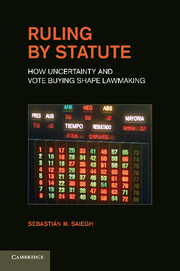1 - Introduction
Published online by Cambridge University Press: 03 May 2011
Summary
On July 27, 2002, after almost eighteen months of debate and delay, the Republican-controlled Congress granted President George W. Bush “fast-track” authority to negotiate international trade pacts. Most Democrats railed against the bill as a nail in the coffin of the U.S. manufacturing sector. In contrast, most Republicans supported the measure and argued that it would bring economic growth and lower consumer prices. Yet, trade is always a difficult issue in the House, and fearful that free trade would cost jobs in their districts, many Republicans broke ranks and joined the opposition. Meanwhile, Democrats from export-dependent districts were supportive of the measure. Democratic leaders, however, wished to keep most of their party voting against the bill to force Republicans from vulnerable areas to cast a “yes” vote that could be used against them in the November election. With such powerful crosscurrents, GOP leaders were wary of forcing members to take such a controversial vote. Anticipating that only his personal involvement could break the logjam, President Bush went to the Capitol and told Republicans that the economic future of the country was at stake. But even after the president's direct intervention, the outcome of the vote remained uncertain. Senior administration officials worked side by side with majority whip, Tom DeLay, trying to round up votes. When the bill came to the floor, these efforts paid off.
- Type
- Chapter
- Information
- Ruling by StatuteHow Uncertainty and Vote Buying Shape Lawmaking, pp. 3 - 14Publisher: Cambridge University PressPrint publication year: 2011



